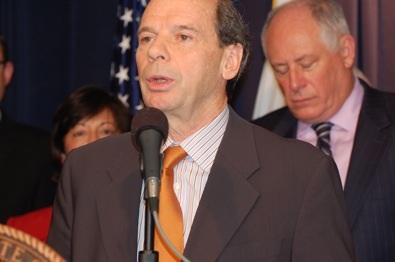|
Reader comments closed for the weekend
Friday, Nov 19, 2010 - Posted by Rich Miller * Today is Barton Lorimor’s last day as my intern. Barton has served us all well, so I wanted to take this opportunity to thank him for all his hard work and long hours. I’ve developed great relations with all my interns, and it’s tough to see them go. Barton will definitely be missed. Barton requested a song for our traditional Friday post. Booker T. and the MGs will play us out… They may call you Doctor, or they may call you Chief 
|
|
Quinn asks for cabinet member resignations
Friday, Nov 19, 2010 - Posted by Rich Miller * Back on November 6th, Gov. Pat Quinn talked about asking for resignations from his cabinet members…
* I’ve confirmed that those resignation requests have now been issued. David Ormsby has a bit more…
|
|
Question of the day
Friday, Nov 19, 2010 - Posted by Rich Miller * From an e-mail…
Our annual Golden Horseshoe awards started out as just a bit of fun, but they’ve morphed into something much greater than that. Statehouse people really take this stuff seriously. We’ll start the nomination process sometime after veto session ends next month. But before we get to that, let’s tackle this… * The Question: Now that we’ve gone all mainstream, should we rename our annual award? And, if so, what should the new name be? * Bonus Question: Are there any new categories you’d like to see added this year? …Adding… These were our categories last year…
|
|
*** UPDATED x1 *** Recent moments in Massive FAIL
Friday, Nov 19, 2010 - Posted by Rich Miller * The Chicago Cubs owners have not had a great week. Their universally panned rollout of their taxpayer-financed stadium remodeling has been a massive failure so far. And they’ve now even managed to embarrass themselves during what ought to be a wildly favorable publicity stunt. As you may know by now, Wrigley Field will play host to this weekend’s Illinois vs. Northwestern football game. The Ricketts family has ordered their park’s famous marquee painted “Wildcat Purple.” The outside of the stadium has been “swathed with Northwestern football pictures.” Everybody is just so excited. Well, maybe not everybody. Because the field of play is so small, the teams will be able to use only one end-zone tomorrow…
From the Big Ten…
Oy. *** UPDATE *** With a hat tip to a commenter, the endzone FAIL in question…  Oof. * Speaking of failures, remember William Kelly? He ran for state comptroller and failed. He was hired by an independent US Senate candidate to gather petitions and failed. He even failed when he tried to move a sign posted by the Freedom From Religion Foundation in the Statehouse rotunda. Michael Sneed’s lede this morning…
You can relive the hilarity by clicking here. * Alas, another fail. From Kelly’s Facebook page…
Maybe next he’ll follow through with his claims of “assault” against a young woman who works for Rahm Emanuel. Sheesh. * And our failure quote of the day comes from failed Green Party gubernatorial nominee Rich Whitney on this month’s election results…
The Greens need to start learning from their failures rather than just being hopelessly optimistic. This advice from Dan Proft to the Illinois Republicans could just as easily apply to them…
|
|
It’s not a crime in Glenwood for a police dispatcher to tip off drug dealers
Friday, Nov 19, 2010 - Posted by Rich Miller * In the “There oughtta be a law” category, we have this…
* From the opinion…
Apparently what happened is that the police chief claimed the employee violated a rule, but the alleged rule was never voted on by the village board of trustees. No vote equals no “law.” No law violation equals no crime. I think maybe somebody should now make this a crime. Glenwood might also want to start vetting its dispatchers a bit better.
|
|
The Statehouse meat starts to cook
Friday, Nov 19, 2010 - Posted by Rich Miller * The veto session kicked into a much higher gear yesterday…
Subscribers already know what that could mean. * More stuff…
* More pension reform is also on the way…
A whole lot more happened yesterday, but you have to subscribe to find out what it was. * Meanwhile, Progress Illinois took a look at the numbers in the House on a tax hike plan in the wake of the election…
Only a few of those people who won reelection and voted against a tax hike last spring could be tapped to vote “Yes” this time around, however. The key here is to look at lame ducks in both parties. It’ll be close either way. * Roundup…
|
|
Morning Shorts
Friday, Nov 19, 2010 - Posted by Rich Miller * Illinois jobless rate falls for 7th month in a row * Jobless benefits to expire as Congress debates tax * Report card has Illinois students beating national average
* Small number of City College students moving on
* Illinois Ranks 35th in Protecting Kids from Tobacco * $4.5 Million Federal Grant to Give 1500 Illinois Prisoners’ Kids Big Brothers Big Sisters Mentors * U.S. Sen. Burris: ‘This is simply unacceptable’
* Burris says absence of blacks in next Senate is unacceptable * Cook County ‘Clout List’ Details How Stroger Regime Rained Jobs on Friends
* Preckwinkle: All county leaders must share in 21% spending cuts
* Preckwinkle: County Faces $487M Shortfall * Preckwinkle sounds alarm on county budget shortfall * Preckwinkle orders 21% Cook County spending cuts * Sun-Times: County spending cuts overdue * Southtown: Property taxes: Little room for sunny outlook * Kiki Yablon Leaving Reader
* RTA job search won’t end quickly * Metra Task Force To Discuss Pollution * The city that works at Christmas . . . sort of * U.S. Senate OKs bill against Asian carp * Kirk To Vote Again on Don’t Ask Don’t Tell * Navistar’s Sharp named to NCC board * Lisle police chief announces retirement * Elgin will keep at-large council system * Citing family, work, Speer won’t run in February in Streamwood * Buffalo Grove budget expected to drop in 2011 * Malay seeks to replace Richards on St. Charles council * Boone County Board passes balanced budget for 2011 * Possible Earmark Ban Could Slow Down New I-74 Bridge Project * Tazewell board OKs raise * Pekin City Manager Announces Resignation * Peoria County OKs balanced budget for 2011 * Journal-Star: May the mayor now appreciate the ‘can’ and ‘can’t’ of office * ICC reduces its tax rate * Eureka council tentatively OKs tax levy * Candidates already launching campaigns for April’s local elections * U. of Ill. faculty: Clout firewall appears to work * Gary Minish picked as next SIUC provost * PCCC chairman Coffey to run for mayor of Springfield * News-Democrat: No veto; let people vote
* Madison County to cut 25 jobs * Jackson County seeks $3 million from bonds * Walsh victory party Sunday in Lakemoor
|
|
Caption contest!
Friday, Nov 19, 2010 - Posted by Rich Miller * We haven’t done one of these in a while. And it’s Friday, so let’s have some fun… 
|
|
Protected: SUBSCRIBERS ONLY - Supplement to today’s edition
Friday, Nov 19, 2010 - Posted by Rich Miller
|
|
Protected: SUBSCRIBERS ONLY - Today’s edition of Capitol Fax (use all CAPS in password)
Friday, Nov 19, 2010 - Posted by Rich Miller
|
|
Protected: SUBSCRIBERS ONLY: This just in…
Friday, Nov 19, 2010 - Posted by Rich Miller
|
| « NEWER POSTS | PREVIOUS POSTS » |


















